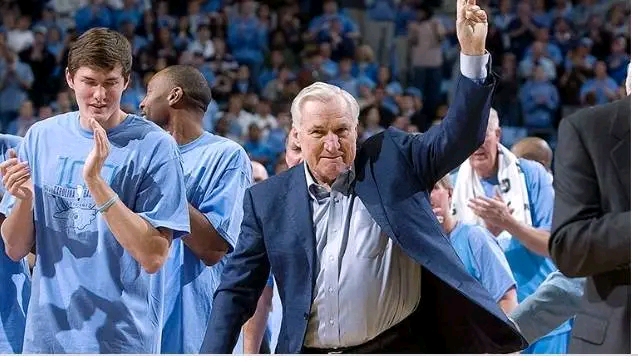Good Legacy in UNC: ESPN Now Confirms Dean Smith Built a Kingdom in Carolina — The Coach Who Gave UNC Its Soul and Changed College Basketball Forever with……
The University of North Carolina at Chapel Hill has been home to some of the most iconic names in the history of college basketball, but at the heart of its success lies one man—Dean Edwards Smith. This week, ESPN published a feature that reignited national conversation about Smith’s unmatched influence, declaring that he did not merely coach basketball, but built a kingdom in Carolina. The report emphasized that Smith was not only a winner in terms of championships, but also a visionary who gave UNC its very soul and transformed the landscape of college basketball forever.
Smith, who coached at UNC from 1961 to 1997, is remembered as more than a coach. He was an architect of culture, an innovator of the modern game, and a leader whose philosophy extended far beyond the court. When he arrived in Chapel Hill, UNC already had basketball history, but it lacked a unifying identity that blended athletic dominance with academic excellence and moral grounding. By the time he retired, Smith had created a dynasty that produced not just victories, but legacies—turning players into leaders and transforming UNC into a symbol of consistency and excellence.
ESPN’s analysis highlighted his remarkable record: 879 wins, 2 national championships (1982 and 1993), 11 Final Four appearances, and a reputation for recruiting and nurturing talent that went on to dominate both in college and in the NBA. Legends such as Michael Jordan, James Worthy, Sam Perkins, and Vince Carter all came through the program, carrying Smith’s philosophy with them into the professional arena. Jordan himself once stated that Dean Smith was the only man who could “hold him under 20 points a game,” referencing Smith’s team-first system that prioritized collective success over individual glory.
But Smith’s greatest impact was not just in numbers. ESPN underscored his revolutionary strategies that permanently changed the sport: the introduction of the “four corners” offense, which led directly to the creation of the shot clock in college basketball, and his insistence on team rituals like pointing to the passer after scoring—a small but profound gesture that reinforced selflessness.
Off the court, Smith was equally influential. He stood against racial segregation at a time when it was unpopular and difficult to do so in the South. In 1966, he recruited Charlie Scott, the first African-American scholarship athlete at UNC, breaking barriers and setting a precedent that rippled across college athletics. His advocacy for equality, respect, and education positioned him as more than a coach—he was a moral compass for the university and for the sport at large.
ESPN’s feature referred to Smith as “the man who gave Carolina its conscience.” His players graduated at high rates, and many credited their personal growth to his life lessons as much as his basketball instruction. Dean Smith demanded discipline, teamwork, and accountability, values that shaped generations of athletes long after their playing days ended.
Now, decades after his retirement and years after his passing in 2015, Smith’s kingdom still stands strong in Chapel Hill. The banners in the Dean E. Smith Center, the arena named in his honor, continue to inspire both players and fans. His coaching tree stretches across the NCAA and NBA, influencing modern coaches who carry on his philosophy of unity, respect, and innovation.
ESPN’s confirmation that Smith built a “kingdom” is more than a tribute—it is a recognition of how his life’s work reshaped an entire sport. While statistics and championships define part of his greatness, it is the soul he gave UNC, the culture of humility and excellence he left behind, and the way he changed college basketball forever that ensures his name will never fade.
Dean Smith’s legacy is not just good—it is eternal.
Would you like me to shape this piece more like a formal ESPN-style article (objective reporting), or more like a feature column with emotional storytelling.
